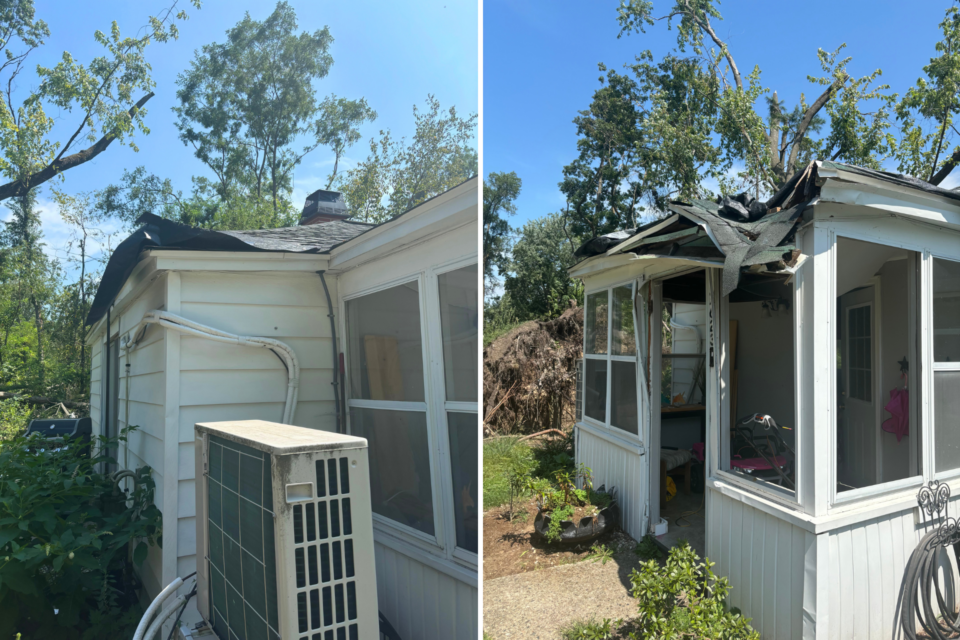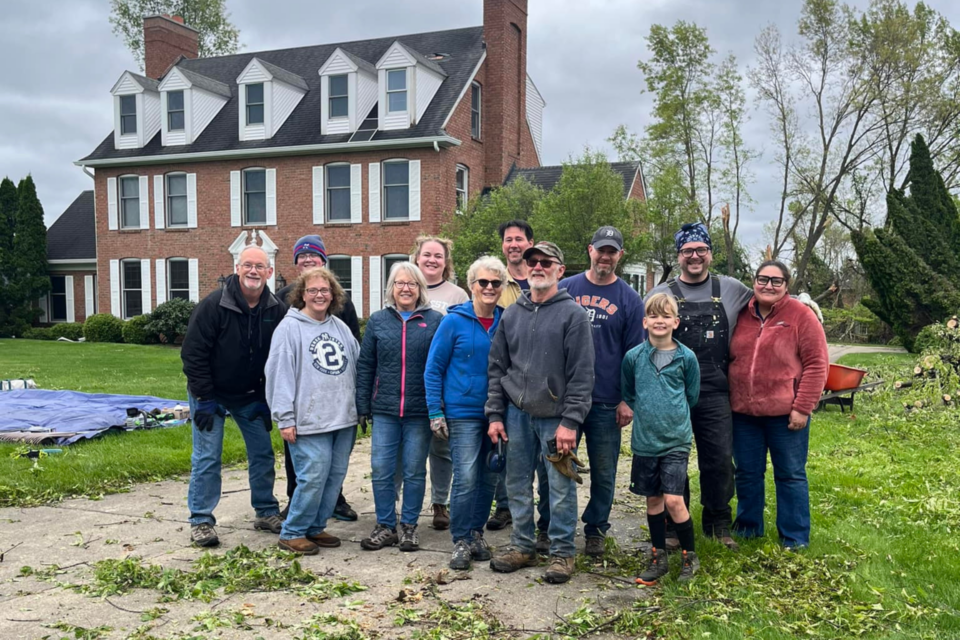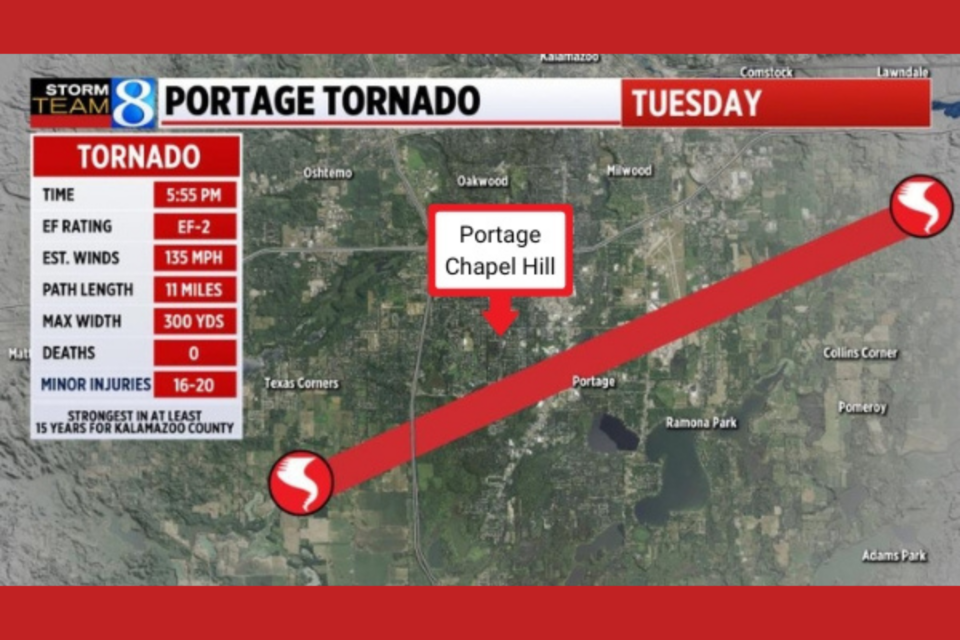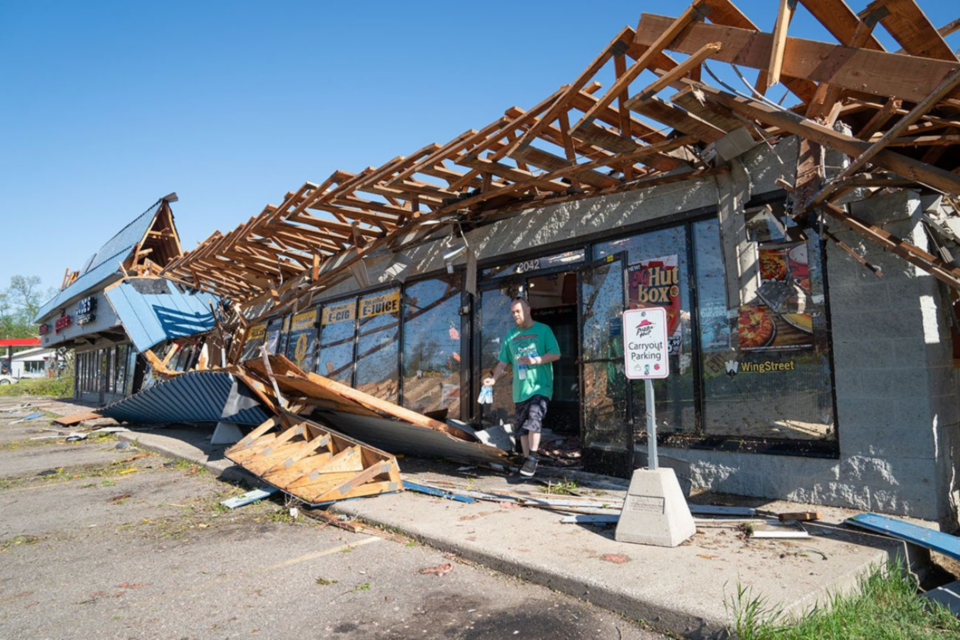After The Storm, the Michigan Conference’s disaster recovery ministry, continues to walk with families in Kalamazoo County as they rebuild their lives months after a devastating tornado.
FAITH GREEN TIMMONS
Michigan Conference Communications
Imagine the familiar sounds of sirens indicating a tornado warning, then wind gusts. Within moments, what had been the staircase of a neighbor’s porch is careening toward your window. You grab your children and flee to a nearby walk-in closet. You witness without so much as a backward glance that the room where you once stood is gone.
In that order, on May 7, 2024, in Kalamazoo County, a tornado moving at 135 miles per hour left Rashanda Stapleton’s home and vehicles demolished.
That same week, Rev. April Gutierrez arrived in the Portage area in preparation for her new appointment as co-pastor of Portage: Chapel Hill UMC. Her husband and children were ready to begin transforming the church parsonage into their family home. They were met with the sight of damages caused by an EF2 tornado as it moved along its 11-mile path of destruction.
Congregation members worked to remove fallen tree limbs and make repairs. Then, Pastor Gutierrez joined her new neighbors and church volunteers in responding to the needs of others.

As Kalamazoo County declared a state of emergency, area churches, local municipalities, and other organizations immediately responded to urgent needs. Yet, four months later, many citizens throughout the community, now living in dire circumstances because of the tornado, still have unmet long-term needs.
The Michigan Conference of The United Methodist Church is making notable strides in helping people rebuild their lives through After The Storm, which has become an expert in disaster case management in Michigan.
“My life has changed since I connected with Tina [McGinnis],” remarked Carey Fouts, another tornado survivor. McGinnis is a disaster case manager for After The Storm. Fouts first learned of After The Storm, a disaster recovery nonprofit launched by the Michigan Conference in 2022, during a televised response to the storm from Michigan Governor Gretchen Whitmer.
Fouts said, “Scrolling at the bottom of the screen was a message for those in need of help. I called that number, and two weeks later, I heard from Tina at After The Storm, and everything changed. Things started moving. I honestly don’t know where we would be without her. We have partnered together in getting things done.”
Fouts’ 28-year-old daughter and her two grandchildren moved in after property damage left them with no electricity, a caving roof, and interior water damage. Large-scale debris so thoroughly covered the area that the house was nearly indistinguishable from the street.
After The Storm hired Tina McGinnis and Rob Mowry as disaster case managers to help people in Kalamazoo County manage their long-term, storm-related problems. They stepped in to make assessments, vet skilled workers and potential volunteers, and navigate a complex myriad of programs, organizations, agencies, protocols, and systematic requirements that were proving both difficult and disheartening for those already struggling to recover from the storm.
“Many of our clients are under-insured, uninsured, and faced at least one if not several pre-existing challenges before the storm,” said Mowry. “Many were under-resourced families, living in trailers. Some were displaced and are now homeless. Some have homeowner’s policies and are negotiating insurance reimbursement. Knowing how to get that information requires information competency. That is one way I recognized that we can help.”

Rashanda Stapleton and Carey Fouts are two of about 85 clients working with After The Storm in Kalamazoo County. Both women say their interactions with After The Storm and this ministry’s unique assistance are inspiring. After The Storm creates a case-by-case, tailored plan to address the needs of each client household.
For example, Stapleton lost her only means of transportation when a collapsed roof destroyed the family vehicle. Because she could not get to work, she also lost her job. Public transportation was not an option for Stapleton, who struggles physically with chronic illness and lives two miles from the nearest bus route.
Helping potential donors understand the direct correlation between the natural disaster and Stapleton’s urgent need for a dependable car was no simple task. Yet McGinnis took on the task. She visited dealerships, negotiated prices, and solicited the funds.
“We assist with identifying resources, processing applications, setting appointments, and making introductions between our clients and those who can help them,” McGinnis explained. They initiate a “soft handoff” between clients and work contractors so that each homeowner feels comfortable with those who are doing the work.
Project Manager Katie Vokal trains After The Storm’s expanding staff of disaster case managers across Michigan. Each compassionately collaborates with clients and fills a highly specialized recovery niche. After The Storm is now respected and recognized around the state for getting results.
“Compassion really is the key,” said Vokal, “for you can feel their emotions in a raw way. It helps to understand that they may have been told no so many times, in so many ways, that they are frustrated. And perhaps they are not filtering everything they say. Others may not have digital literacy. So, that causes difficulties for them. We often must decipher and translate. We need to understand how to respond to frantic emails.”
Vokal said her insight into sociology gives her empathy and understanding for people who have yet to develop certain communication skills. “[Our] goal is to empower people and facilitate the process of getting their needs met. We have to navigate the rules and structures of certain churches, community service groups, banks, and various levels of government, as well as our own. By the time they get to us, some of our clients are understandably exhausted.”
After The Storm paired McGinnis and Mowry together because of their complementary backgrounds and skills. Both of them appreciate The United Methodist Church from experiences in their upbringings.

Mowry said he relates to the sense of service, life mission, and empathy required for serving in disaster recovery. He lived through the 2011 earthquake and tsunami that caused an estimated death toll of 20,000 people in Japan, plus the Fukushima nuclear accident that followed. As a result of this triple catastrophe, he now specializes in studying disaster relief and welfare.
McGinnis lives in Portage. Her husband, Patrick, is the city manager. Her experience as a resident lends a deeply personal perspective. They received a call when the storm struck. “Patrick headed out and got no further than a block and a half,” McGinnis recalled. Traffic obstructed the route to city hall, lined with demolished buildings and collapsing homes. While there was not so much as a strong wind at her house, the devastation within walking distance was calamitous. “My husband returned home, got his bike, and had to ride to his office. The roads were so bad.” For both of them, being able to help is a blessing.
“This is a God thing,” said McGinnis. “Time after time, people who don’t consider themselves strong in faith start to have that faith-led conversation. Because everyone has a moment when they see: ‘This is bigger than I am.’”
McGinnis grew up a United Methodist, and she is honored to have that connection, yet realizes that it is uncomfortable for some. “Some homeowners don’t initially want ‘church money’ or anything to do with a church-related nonprofit. I tell them, ‘Look at this as people who want to help, and they know that 100 percent of what they give will go to these efforts.’ After we help, you can see and feel people begin to sense that we are here to bless them. I have been told, ‘The minute we walk into a space, you bring a difference.’ It’s a feeling that you can’t verbalize. But it’s the volunteers, the contractors, and the case managers who are all here to help.”
“It amazes me that God can use [After The Storm] in such a large capacity because we allow God to use us,” said Vokal. “When you first meet people in need,” says the UMCOR-trained case manager, “we hug, we cry, and then we talk. If God weren’t leading us, we’d be completely overwhelmed. But there are little winks that God gives that help convey that we are here to help, that we are the hands and feet of Christ at work here!”
Visit After The Storm’s website to learn more about volunteering and to donate financially to this vital Michigan Conference disaster recovery ministry.
Editor’s note: Does your church have a plan for floods, structural fires, tornadoes, ice storms, blizzards, and wildfires? Download, print, read, and understand the 2024 Michigan Conference Disaster Response Plan, and then prepare to act when disaster strikes in your local church community. After The Storm plays a role in this conference-initiated plan.

